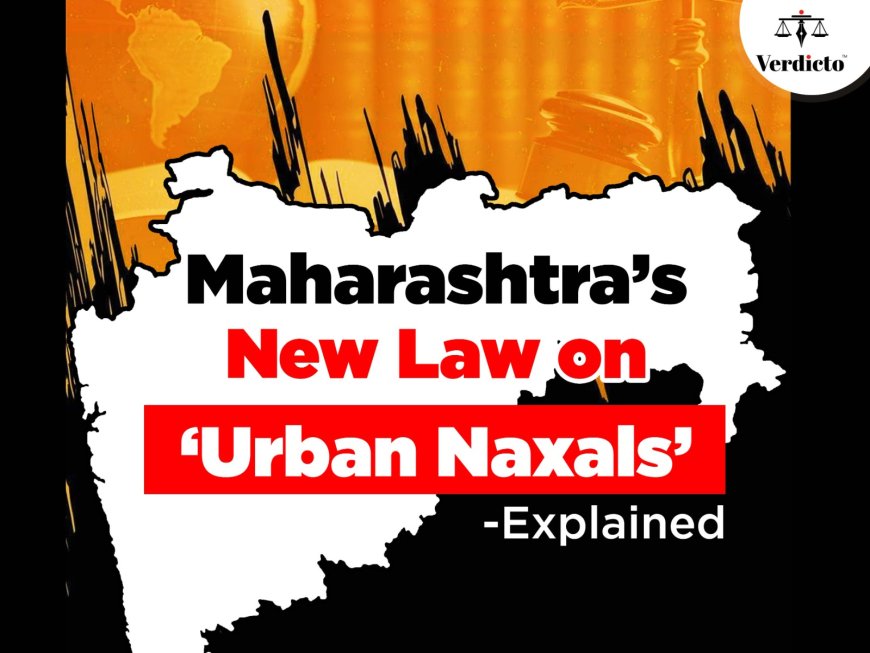What Is the Maharashtra Special Public Security Bill?
The Maharashtra Assembly passes the Special Public Security Bill to curb urban Naxalism. Critics warn of vague definitions and potential misuse. Here's what the law means, its key provisions, and the legal debate it has sparked.

The Maharashtra Assembly recently passed the Maharashtra Special Public Security (MSPS) Bill, 2024, through a voice vote. The legislation aims to crack down on Left Wing Extremist (LWE) organisations, particularly their alleged urban networks operating under the guise of civil society fronts.
Once enacted, Maharashtra will join Chhattisgarh, Telangana, Andhra Pradesh, and Odisha in having a dedicated public security law to tackle LWE.
What Does the Bill Aim to Do?
The Bill was introduced to address the urban spread of Naxalism. While districts like Gadchiroli and Gondia remain LWE strongholds, the state government believes that urban areas are increasingly being used by extremist groups for:
Logistics and recruitment
Propaganda
Providing shelter to armed cadres
The Statement of Objects and Reasons states that existing legal frameworks are inadequate to deal with these developments.
Key Provisions of the MSPS Bill, 2024
- Declaring Organisations "Unlawful"
The Bill gives the state government the power to designate any organisation as unlawful if it engages in or supports unlawful activities. - Four Main Offences:
Being a member of an unlawful organisation
Raising funds for such an organisation, even if not a member
Managing or assisting in the group’s operations
Committing any unlawful activity - Punishment:
Jail term: 2 to 7 years
Fine: ₹2 lakh to ₹5 lakh
Offences are cognizable and non-bailable
The harshest punishment — 7 years’ imprisonment and ₹5 lakh fine — is reserved for committing unlawful activity.
What Is an "Unlawful Activity"?
The Bill defines unlawful activity broadly, including:
Speech, writing, or signs that disturb public order
Obstruction of law enforcement or government functions
Acts involving violence, vandalism, or threats to public servants
Promoting disobedience to the law
Fundraising for disruptive acts or organisations
Key Amendments by the Joint Select Committee
1. Clearer Targeting in Preamble
Original language:
“Unlawful activities of individuals and organisations”
Revised to:
“Unlawful activities of Left Wing Extremist organisations or similar organisations”
This aims to clarify that the Bill specifically targets Urban Naxalism.
2. Changes to Advisory Board Composition (Clause 5(2))
Original:
Three High Court judges or those qualified to be judges
Revised:
A Chairperson who is or was a High Court judge
One retired judge
One government pleader of the High Court
All to be appointed by the state government
This change seeks a more diverse legal perspective on decisions about banning organisations.
3. Higher Authority for Investigations (Clause 15(2))
Original:
Investigations by police officers not below the rank of Sub-Inspector
Revised:
Now restricted to officers of rank Deputy Superintendent of Police (DSP) or above
Intended to bring greater accountability and experience to sensitive probes.
The Legal Angle
Critics are likely to question the sweeping powers, broad definitions of "unlawful activity", and non-bailable nature of offences. Legal experts may argue that such laws risk curbing civil liberties, especially in the absence of clear procedural safeguards.
On the other hand, state authorities argue that the Bill is necessary to tackle the changing face of extremism, particularly its urban operations, which exploit loopholes in existing laws.
The Maharashtra Special Public Security Bill represents a significant shift in how states approach internal security, from rural counter-insurgency to urban legal frameworks. While its intent may be rooted in national security, its implementation and judicial oversight will determine whether it strengthens democracy or risks infringing on it.
END
Verdicto will continue to follow this story closely, bringing you legal insights, expert interviews, and fact-based analysis.
Stay tuned. Because where law meets journalism — truth must prevail.
📌 Follow us on YouTube, Instagram, and Twitter for more updates.







